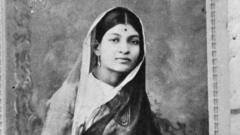On January 12, 1925, a violent attack on Abdul Kadir Bawla and Mumtaz Begum shocked Bombay, drawing national attention and entangling British authorities in a scandal that would cause a princely king to renounce his throne.
### The Infamous Malabar Hill Murder that Shook Colonial India

### The Infamous Malabar Hill Murder that Shook Colonial India
A century-old murder case that exposed royal intrigue and led to a king's abdication.
The murder of Abdul Kadir Bawla, a wealthy textile businessman, thrust into the limelight a drama involving Mumtaz Begum, a beautiful courtesan fleeing royal constraints, and an alarmingly complex web of implications for British colonial rule. Bawla and Begum were ambushed while driving in an affluent Bombay neighborhood. The sensational nature of the crime seized public interest, leading to extensive media coverage and thrilling adaptations, even in Bollywood.
Bawla was killed during the attack while Begum narrowly escaped abduction, sparking a significant investigation linking the assailants to the powerful Indore princely state. As the case unfolded, evidence emerged that the Maharaja of Indore had previously threatened Bawla over his relationship with Begum, escalating tensions around an already volatile situation.
The British government, keen on maintaining stability in its colonies, faced mounting pressure from numerous fronts, including the victim's community and the Indian legislature. Major court proceedings ensued, drawing in notable lawyers, including Muhammad Ali Jinnah, later to become a pivotal figure in Pakistan's foundation. Ultimately, despite the harsh sentencing of several assailants, the Maharaja's involvement was left largely unchecked following his strategic abdication, which allowed him to avoid inquiry.
As a result of this scandal, Mumtaz Begum's life took a turn towards international attention. She later attempted a career in Hollywood. The case remains a poignant reminder of the complexities and intrigues of colonial India, continuing to intrigue historians and spectators alike.
Bawla was killed during the attack while Begum narrowly escaped abduction, sparking a significant investigation linking the assailants to the powerful Indore princely state. As the case unfolded, evidence emerged that the Maharaja of Indore had previously threatened Bawla over his relationship with Begum, escalating tensions around an already volatile situation.
The British government, keen on maintaining stability in its colonies, faced mounting pressure from numerous fronts, including the victim's community and the Indian legislature. Major court proceedings ensued, drawing in notable lawyers, including Muhammad Ali Jinnah, later to become a pivotal figure in Pakistan's foundation. Ultimately, despite the harsh sentencing of several assailants, the Maharaja's involvement was left largely unchecked following his strategic abdication, which allowed him to avoid inquiry.
As a result of this scandal, Mumtaz Begum's life took a turn towards international attention. She later attempted a career in Hollywood. The case remains a poignant reminder of the complexities and intrigues of colonial India, continuing to intrigue historians and spectators alike.




















